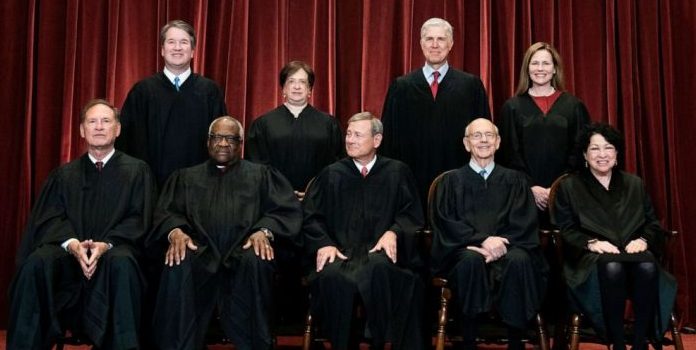(Headline USA) The Supreme Court acted “literally in the middle of the night” and without sufficient explanation in blocking the Trump administration from deporting any Venezuelans held in northern Texas under an 18th-century wartime law, Justice Samuel Alito wrote in a sharp dissent that castigated the seven-member majority.
Joined by fellow conservative Justice Clarence Thomas, Alito said there was “dubious factual support” for granting the request in an emergency appeal from the American Civil Liberties Union. The group contended that immigration authorities appeared to be moving to restart such removals under the Alien Enemies Act of 1798.
The majority did not provide a detailed explanation in the order early Saturday, as is typical, but the court previously said deportations could proceed only after those about to be removed had a chance to argue their case in court and were given “a reasonable time” to contest their pending removals.
“Both the Executive and the Judiciary have an obligation to follow the law,” Alito said in the dissent released hours after the court’s intervention against Republican President Donald Trump’s administration.
The justices’ brief order directed the administration not to remove Venezuelans held in the Bluebonnet Detention Center “until further order of this court.”
Alito said that “unprecedented” relief was “hastily and prematurely granted.”
He wrote that it was not clear whether the Supreme Court had jurisdiction at this stage of the case, saying that not all legal avenues had been played out in lower courts and the justices had not had the chance to hear the government’s side.
“The only papers before this Court were those submitted by the applicants. The Court had not ordered or received a response by the Government regarding either the applicants’ factual allegations or any of the legal issues presented by the application. And the Court did not have the benefit of a Government response filed in any of the lower courts either,” Alito said.
Alito said the legal filings, “while alleging that the applicants were in imminent danger of removal, provided little concrete support for that allegation.” He noted that while the court did not hear directly from the government regarding any planned deportations under the Alien Enemies Act in this case, a government lawyer in a different matter had told a U.S. District Court in a hearing Friday evening that no such deportations were then planned to occur either Friday or Saturday.
“In sum, literally in the middle of the night, the Court issued unprecedented and legally questionable relief without giving the lower courts a chance to rule, without hearing from the opposing party, within eight hours of receiving the application, with dubious factual support for its order, and without providing any explanation for its order,” Alito wrote.
“I refused to join the Court’s order because we had no good reason to think that, under the circumstances, issuing an order at midnight was necessary or appropriate. Both the Executive and the Judiciary have an obligation to follow the law.”
The administration has filed paperwork urging the high court to reconsider its hold.
Adapted from reporting by the Associated Press

